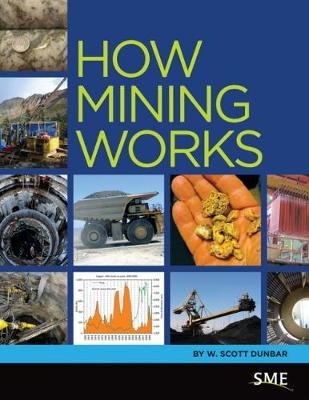
How Mining Works
Seiten
2015
Society for Mining, Metallurgy, and Exploration (Verlag)
978-0-87335-399-1 (ISBN)
Society for Mining, Metallurgy, and Exploration (Verlag)
978-0-87335-399-1 (ISBN)
Explains complex mining concepts in a way simple enough for those who are not familiar with the industry, yet thorough enogh to be useful to long-time professionals. This colourful book presents a logical and sensible sequence for acquiring a strong working knowledge of the world of mining.
Finally – Mining in Clear and Understandable Language.
How Mining Works explains complex mining concepts in a way simple enough for those who are not familiar with the industry, yet thorough enogh to be useful to long-time professionals.
This colorful book presents a logical and sensible sequence for acquiring a strong working knowledge of the world of mining. Chapter 1 provides a quick geology review, explaining how the earth is structured … how, why, and where mineral ores are created … and how technological advances help us make educated guesses about where to locate new mines.
The next three chapters present mining and refining operations. Chapter 2 offers in-depth explanations about the different types of mining, the equipment and procedures needed for both surface and deep mining, and Chapter 3 follows with six methods for processing the ore into usable refined metal. And, since not all mines produce metals, Chapter 4 covers nonmetallic operations that produce coal, diamonds, and aggregates such as clays and feldspars.
The second half of the book puts mining in the context of the wider world. Chapter 5 examines four types of mining waste (including several subcategories) and how to deal with each. Chapter 6 looks at labor practices, environmental sustainability, and worker and community health and safety—all critical in today’s highly regulated environment.
Chapter 7 highlights mining economics, with detailed information on how mine products are priced, monetary arrangements between mines and smelters, and even the impact of reserves on mining’s future.
Chapter 8 takes a visionary yet practical look at the future of mining, covering not only advances in expected areas (like robotics) but also in biotechnology, with a fascinating look at how plants, insects, and various microbes could be used to extract metals. Appendix A provides a crash course in the chemistry sometimes needed to understand why rock goes in and metal comes out.
Finally – Mining in Clear and Understandable Language.
How Mining Works explains complex mining concepts in a way simple enough for those who are not familiar with the industry, yet thorough enogh to be useful to long-time professionals.
This colorful book presents a logical and sensible sequence for acquiring a strong working knowledge of the world of mining. Chapter 1 provides a quick geology review, explaining how the earth is structured … how, why, and where mineral ores are created … and how technological advances help us make educated guesses about where to locate new mines.
The next three chapters present mining and refining operations. Chapter 2 offers in-depth explanations about the different types of mining, the equipment and procedures needed for both surface and deep mining, and Chapter 3 follows with six methods for processing the ore into usable refined metal. And, since not all mines produce metals, Chapter 4 covers nonmetallic operations that produce coal, diamonds, and aggregates such as clays and feldspars.
The second half of the book puts mining in the context of the wider world. Chapter 5 examines four types of mining waste (including several subcategories) and how to deal with each. Chapter 6 looks at labor practices, environmental sustainability, and worker and community health and safety—all critical in today’s highly regulated environment.
Chapter 7 highlights mining economics, with detailed information on how mine products are priced, monetary arrangements between mines and smelters, and even the impact of reserves on mining’s future.
Chapter 8 takes a visionary yet practical look at the future of mining, covering not only advances in expected areas (like robotics) but also in biotechnology, with a fascinating look at how plants, insects, and various microbes could be used to extract metals. Appendix A provides a crash course in the chemistry sometimes needed to understand why rock goes in and metal comes out.
| Erscheinungsdatum | 20.01.2016 |
|---|---|
| Verlagsort | Colorado |
| Sprache | englisch |
| Maße | 216 x 279 mm |
| Gewicht | 820 g |
| Themenwelt | Technik ► Bergbau |
| Technik ► Maschinenbau | |
| ISBN-10 | 0-87335-399-4 / 0873353994 |
| ISBN-13 | 978-0-87335-399-1 / 9780873353991 |
| Zustand | Neuware |
| Haben Sie eine Frage zum Produkt? |
Mehr entdecken
aus dem Bereich
aus dem Bereich
technische Grundlagen, Risikomanagement, Umweltauswirkungen
Buch | Hardcover (2023)
Hanser (Verlag)
CHF 139,95
Aluminium, Blei, Kupfer, Magnesium, Nickel, Zink, Zinn
Buch | Softcover (2021)
DIN Media (Verlag)
CHF 249,95
Buch | Softcover (2021)
DIN Media (Verlag)
CHF 329,40


